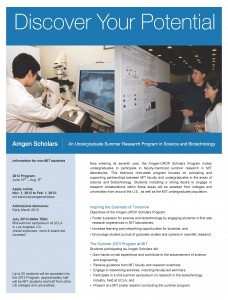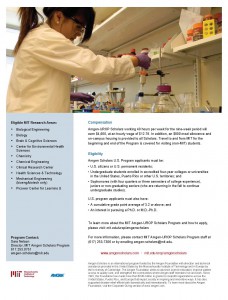The Mount Desert Island Biological Laboratory has established programs for undergraduate education to enhance scientific training in the biological sciences.
Through courses, fellowships, and enrichment activities, MDIBL excels in training undergraduate students considering careers in research or medicine. MDIBL is a highly collaborative, collegial, and informal research environment, where students and scientists design and conduct experiments together and may discuss their results on a bench overlooking Frenchman Bay or over a meal in the dining hall.
Short Courses
MDIBL has a extensive program of year-round, hands-on, research intensive short courses, workshops and symposia for undergraduate students. Most courses are closed-enrollment and only offered to students from the sending institutions. All MDIBL Courses and Conferences are listed on this website.
Summer Research Fellowships:
The Research Experience
Each summer, over 30 undergraduates from Maine and across the United States participate in research fellowships at MDIBL. Undergraduate fellows work in the laboratory of an MDIBL investigator on an independent project designed by the student and their mentor. Laboratory training can include techniques in molecular biology, physiology, and bioinformatics. Projects are wide-ranging and could include the comparative study of a laboratory animal (zebrafish, roundworm, sea urchin, etc.), cultured cells, and biological tissue preparations. While most projects are laboratory-based, some include a field component. In pursuing their independent research project, students attend weekly seminars given by MDIBL scientists and invited speakers from other institutions discussing a variety of topics in the biological and environmental sciences.
Dates
Undergraduate research fellowships are 8 – 10 weeks long, from early June to mid August. In 2014, most students will arrive on Monday, June 2 and will depart on Friday, August 8.
Mentors
Students may select a summer research mentor from among the Lab’sresident or visiting faculty whose research matches their personal scientific interests and career goals. Students applying to the Maine INBRE undergraduate program may select a mentor from MDIBL or one one of several Maine INBRE partner institutions.
MDIBL Campus living
Undergraduate summer research fellowships are 8 – 10 weeks long. Students are typically housed in either Spruce or Birch Hall. Meals are served in the MDIBL Co-op (called Co-op because students are responsible for their own meals on weekends).
Weekends are typically free and students enjoy recreational activities including hiking in Acadia National Park, swimming in Acadia’s pristine ponds, biking, running, sand pit volleyball, soccer, Ultimate Frisbee, kayaking, or just relaxing on the Lab dock.
Admissions and Funding
Summer Research Fellowship applications are generally accepted in late fall, with an application deadline in early January. Most fellowships cover all expenses (room, board, travel) and pay a weekly stipend.





